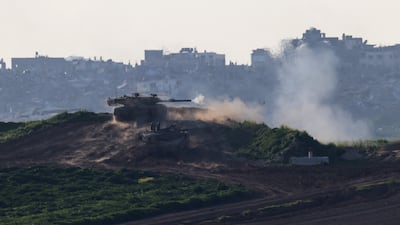The Bank of Israel kept interest rates steady on Monday in an effort to support financial markets and boost its economy, which has taken a battering due to the continued war in Gaza.
Israel's monetary committee maintained its benchmark rate at 4.5 per cent, the central bank said on its website.
“The monetary committee’s discussions that were held in the past two days naturally focused on the economic impacts of the war. The monetary committee analysed the various processes and their impact on economic activity and on inflation, and after the discussions, the committee decided to leave the interest rate unchanged at 4.5 per cent,” Bank of Israel governor Amir Yaron said in a statement.
"Expectations for one year ahead also increased slightly recently. The interest rate path will be determined in accordance with the continued convergence of the inflation rate to its target, continued stability in financial markets, economic activity, and fiscal policy."
He added that there is still "uncertainty related to the impacts of the war on inflation processes".

The latest rate decision follows the Bank of Israel's January move to slash its benchmark interest rate by 0.25 basis points, marking the first cut since April 2020.
The war in Gaza, which began on October 7 after a deadly attack by Hamas, has turned into a human tragedy as Israel has maintained a relentless bombing campaign in retaliation.
About 30,000 Palestinians have been killed since the fighting started, according to the Palestinian Health Ministry.
The US has been Israel's biggest supporter throughout the conflict, providing weapons and ammunition and thrice vetoing UN Security Council resolutions calling for an immediate ceasefire.
The war severely damaged Gaza's civil and residential infrastructure and its gross domestic product is now projected to shrink by 3.7 per cent, from a previous growth forecast of 3.2 per cent, with the economy at a “near-complete standstill”, according to World Bank data.
Israel’s economy has also taken a severe hit and contracted by an annualised 19.4 per cent in the fourth quarter, the country’s Central Bureau of Statistics said earlier this month.
Overall, its economy grew 2 per cent for the whole of 2023, compared with 6.5 per cent in the previous year.
“The contraction of the economy in the fourth quarter of 2023 was directly affected by the outbreak of the Iron Swords War on October 7,” the statistics agency said at the time, citing initial estimates.
Moody’s Investors Service this month also downgraded the country's credit rating from “A1" to “A2" with a negative outlook.
“The main driver for the downgrade of Israel's rating is Moody's assessment that the continuing military conflict with Hamas, its aftermath and wider consequences materially raise political risk for Israel, as well as weaken its executive and legislative institutions and its fiscal strength for the foreseeable future,” it said.
Mr Yaron said it appears that the risks noted by Moody's have "already been priced in by investors, and in the financial and foreign exchange markets, an additional significant impact of the credit rating downgrade has not been seen".
"To strengthen the trust of the markets and ratings companies in Israel’s economy, it is important that the government and Knesset act to deal with the economic issues raised in the report, which in large part are very similar to the recommendations raised in the past by the Bank of Israel and other entities," he added.
"These will require structural changes in government ministries and prioritising growth drivers."
In the coming years, Israel's budget deficit will be significantly larger than expected before the conflict, Moody’s said.
The Bank of Israel estimates the cost of the conflict for the years 2023 to 2025 to stand at about 255 billion shekels ($64.4 billion) or 13 per cent of the 2024 forecast GDP, which includes both higher defence and civilian spending, as well as lower tax revenue.
It raised last year's budget deficit from less than 2 per cent to 4.2 per cent of GDP in the supplementary budget approved in mid-December.
The revised budget for this year sets a deficit of 6.6 per cent of GDP, compared with a pre-conflict forecast of about 2.5 per cent.


